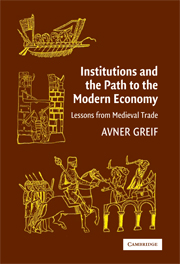Book contents
- Frontmatter
- Contents
- Abbreviations
- Preface
- I Preliminaries
- II Institutions as Systems in Equilibria
- III Institutional Dynamics as a Historical Process
- IV The Empirical Method of Comparative and Historical Institutional Analysis
- V Concluding Comments
- Appendixes
- A A Primer in Game Theory
- B Is Homo Sociologicus Strategic?
- C The Role of Theory: Reputation-Based Private-Order Institutions
- References
- Index
- POLITICAL ECONOMY OF INSTITUTIONS AND DECISIONS
C - The Role of Theory: Reputation-Based Private-Order Institutions
Published online by Cambridge University Press: 05 September 2012
- Frontmatter
- Contents
- Abbreviations
- Preface
- I Preliminaries
- II Institutions as Systems in Equilibria
- III Institutional Dynamics as a Historical Process
- IV The Empirical Method of Comparative and Historical Institutional Analysis
- V Concluding Comments
- Appendixes
- A A Primer in Game Theory
- B Is Homo Sociologicus Strategic?
- C The Role of Theory: Reputation-Based Private-Order Institutions
- References
- Index
- POLITICAL ECONOMY OF INSTITUTIONS AND DECISIONS
Summary
Theory is unavoidable in positive institutional analysis. Implicitly or explicitly, a student of institutions resorts to theory to guide the selection of issues and to identify relevant factors and causal relationships. Theoretical assertions about the importance of exchange, polities, and the harnessing of coercive power direct the investigation of the institutional foundations of agency relationships, property rights security, impersonal exchange, and the mobilization of resources for collective action. Theinvestigation itself is directed by a concept of institutions central to which are intertransactional linkages and the associated institutional elements, self-enforceability, and the nature of institutional development as a historical process. Game theory tells us what to look for in considering and evaluating the self-enforceability of institutional elements in a given environment.
Theory also makes another important contribution. By pointing to the general principles that underpin the operation of institutions that can lead to a particular outcome, theory indicates that institutions – and the history they induce – are not random. Context and contingency are important, but institutions generating similar behavior in the same central transactions are subject to the same forces and have to respond to the same considerations regardless of the particularities of time and place. Institutions that achieve the same outcomes have to mitigate the same problems that are implied by the inherent attributes of the central transaction under consideration and by the general context.
- Type
- Chapter
- Information
- Institutions and the Path to the Modern EconomyLessons from Medieval Trade, pp. 428 - 452Publisher: Cambridge University PressPrint publication year: 2006



